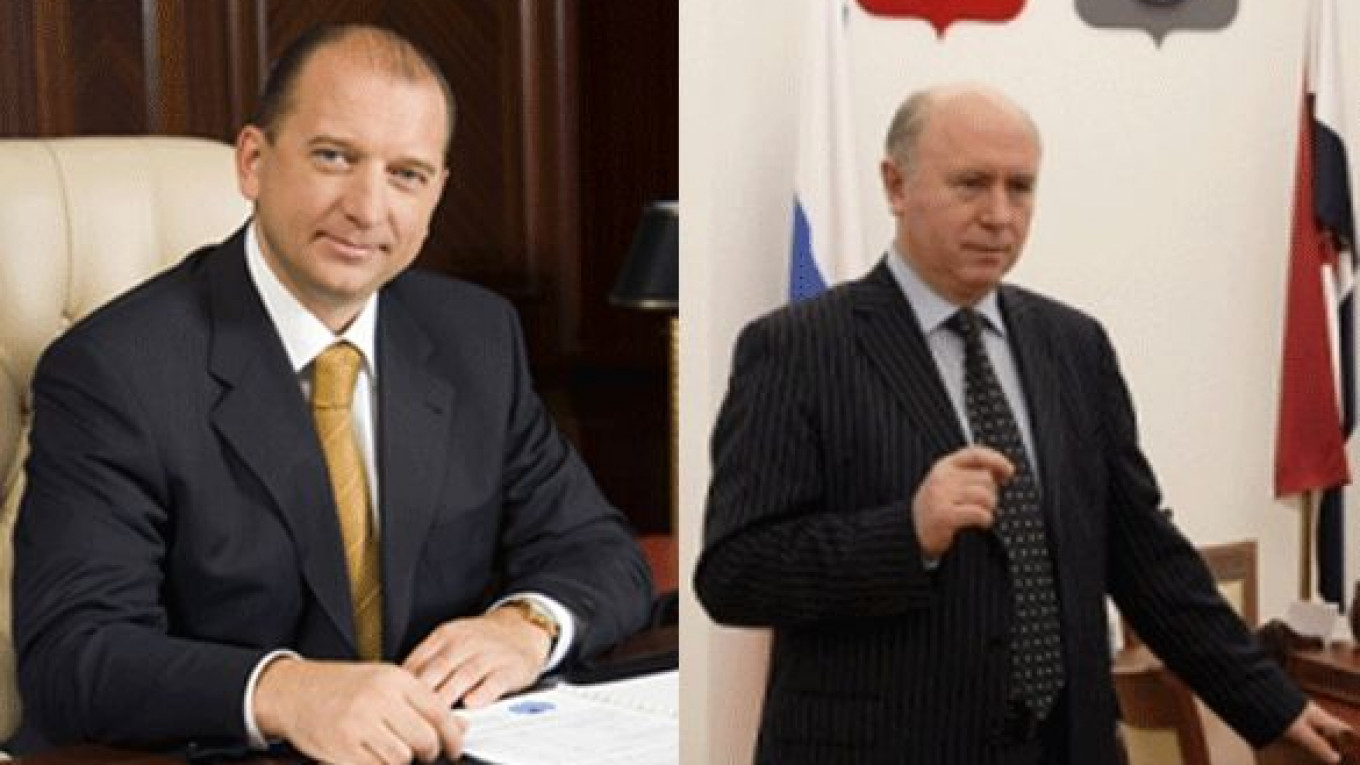The governors of the Samara and Leningrad regions resigned Thursday as the Kremlin pushed ahead with a campaign to replace unpopular regional leaders before the first direct gubernatorial elections this fall.
The Kremlin immediately replaced Governor Vladimir Artyakov, a former senior manager with the AvtoVAZ carmaker who had led Samara since 2007, with Nikolai Merkushkin, the long-serving leader of the Mordovia republic and a stalwart of the ruling United Russia party.
President Vladimir Putin also accepted the resignation of Leningrad Governor Valery Serdyukov, whose term was to expire in July, but did not name a successor.
Kommersant, citing its own sources, reported on its website that the Leningrad vacancy would be filled by Alexander Drozdenko, who is close to Bank Rossia, the local banking powerhouse whose main shareholder, Yury Kovalchuk, is a longtime Putin associate and controls the Izvestia newspaper and the Ren-TV and Channel 5 television channels. Drozdenko also led Putin's recent presidential campaign in St. Petersburg.
"These developments show that the authorities are afraid of the current situation and are trying to find a way to maneuver," said Dmitry Loboiko, Samara-based political analyst.
Samara and Leningrad voters will chose new governors in October, according to legislation restoring direct gubernatorial elections that Dmitry Medvedev signed shortly before leaving the Kremlin this week. Other regions scheduled to hold elections in October include Novgorod, Amur and Bryansk.
While former Samara Governor Artyakov had promised to run in gubernatorial elections, his chances of winning had been slim. Residents have expressed irritation that Artyakov spent most of his time in Moscow, not Samara.
While Artyakov's rule was not tarnished by major scandals, according to the St. Petersburg Politics think tank, his reputation was stung when a Communist candidate beat United Russia's choice in the mayoral election in March in Tolyatti, the home of AvtoVAZ. In addition, the Communists garnered more votes than United Russia in the region during the State Duma elections in December.
Artyakov, however, might face a good career in Moscow with an appointment to the new Cabinet, possibly as transportation minister, industry lobbyist Vladimir Gutenev said in comments published on Izvestia's website Thursday.
By making Merkushkin acting governor, federal authorities have indicated that they don't have anyone they can rely on in Samara, said Loboiko, the political analyst.
In a sign that Merkushkin might lack local support, Loboiko said the acting governor has no links to the two main business groups in the region, billionaire Viktor Vekselberg's investment arm Renova and Russian Technologies, headed by Putin ally Sergei Chemezov.
Merkushkin, who ruled Mordovia since 1995 and is a protege of Kremlin deputy chief of staff Vyacheslav Volodin, also will not be popular with the local opposition. Back in Mordovia, the opposition accused him of rigging elections in favor of United Russia. Notably, in December's Duma elections, United Russia was declared the victor there with nearly 100 percent of the vote.
In contrast, United Russia fell short of 40 percent of the vote in the Samara region under Artyakov.
The only other regions where United Russia scored close to 100 percent were in the North Caucasus.
A Message from The Moscow Times:
Dear readers,
We are facing unprecedented challenges. Russia's Prosecutor General's Office has designated The Moscow Times as an "undesirable" organization, criminalizing our work and putting our staff at risk of prosecution. This follows our earlier unjust labeling as a "foreign agent."
These actions are direct attempts to silence independent journalism in Russia. The authorities claim our work "discredits the decisions of the Russian leadership." We see things differently: we strive to provide accurate, unbiased reporting on Russia.
We, the journalists of The Moscow Times, refuse to be silenced. But to continue our work, we need your help.
Your support, no matter how small, makes a world of difference. If you can, please support us monthly starting from just $2. It's quick to set up, and every contribution makes a significant impact.
By supporting The Moscow Times, you're defending open, independent journalism in the face of repression. Thank you for standing with us.
Remind me later.






